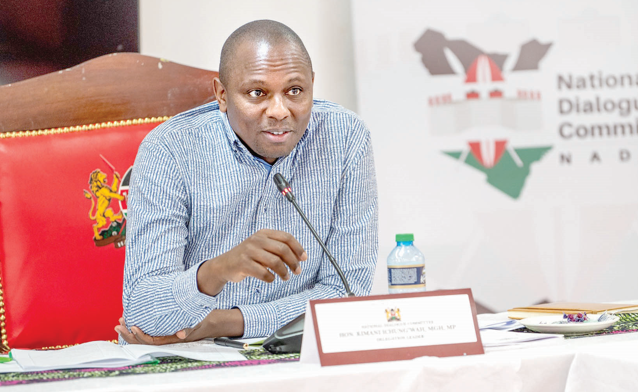Poll audit among changes proposed for electoral body
By Mercy.Mwai, March 7, 2024Parliament has proposed far-reaching changes to the country’s electoral body to address conflicts that arises during general elections.
The proposals contained in the Independent Electoral and Boundaries (IEBC) act 2024 are seeking to delete various sections declared by the high court as unconstitutional, expand the composition of the selection panel that will nominate IEBC commissioners, redefine the definition of a chairperson as well as address issues touching on delimitation of boundaries.
The bill sponsored by both leader of Majority Kimani Ichung’wa and leader of Minority Opiyo Wandayi is also proposing an audit of the elections after every general election, provide quorum of the commission, give the term limits of the Secretary to the commission as well as expand the qualifications of a commissioner.
The bill is a product of the National Dialogue Committee (NADCO) which was formed as a result of negotiations of the bipartisan team encompassing leadership from the Kenya Kwanza Alliance and that from the Azimio la Umoja coalition.
The bill reads: “The bill seeks to give effect to some of the recommendations and views of the public that were submitted during the National dialogue discourse on the issues of Electoral Justice and related matters; outstanding constitutional matter, fidelity to political parties /coalitions and the law on multiparty democracy; entrenchment of the National government Constituency development Fund, the senate oversight fund and The national Government Affirmative action fund and establishment and entrenchment of state officers.”
It adds: “The bill seeks to amend the Independent Electoral and Boundaries (IEBC) act no 9 of the 2011 to clean up the act by deleting obsolete provisions.
“The bill further seeks to make consequential amendments intended to align the act to the judgment of the high court in Katiba Institute and three others versus Attorney General and two others /2018/Eklr wherein the high court held that certain provisions of the act were unconstitutional.”
On the appointment of a chairperson and commissioners, the bill has proposed the deletion of the definition of the word chairperson by deleting the words vice chairperson and a member when discharging the functions of the chairperson.
“It means the Vice Chairperson or a member of the commission cannot assume the role of the chairperson in their absence.
The bill also seeks to delete section 7A of the IEBC act 2011 that allows the vice chairperson to take up the role of the chairperson in his absence.
Reads the bill: “Section 7(A) of the principal act is amended by deleting subsection (4) and by deleting subsection (5)”.
To be able to conduct business, the bill provides that the quorum of a meeting shall be at least five members of the commission and unless a unanimous decision is reached, a decision on any matter before the commission should be by concurrence of a majority of all the members of the commission.
Specific qualification
The move comes after the Court of Appeal in October last year concurred with the High Court that it was not by accident that the constitution and the law set out specific qualifications for the chairperson of the commission different from those of the members.
The move came in the aftermath of the 2017 election when MPs amended section 7A of the act by inserting a clause that would have allowed either the vice chairperson or any member to take up the role of the chair in his absence.
The laws were passed by Jubilee legislators in a process boycotted by National Super Alliance (NASA) as a response to Supreme Court’s decision to annul President Uhuru Kenyatta’s win in the August 8, 2017 elections.
The bill also sought to amend section 6 of the act and include experience in accounting or information and communication technology as additional professional qualifications for appointment as a member of IEBC.
On the position of Secretary to the IEBC, the bill is proposing to reduce the term limit from five years to three years and may be eligible for one further term of three years.
On audit of the election, the bill provides that the commission shall after every general election review its operations and make the necessary changes required to make its operations more efficient, effective, transparent and accountable.
Reads the bill: “The review shall be completed within one year after every general election and the commission shall publish the report in the gazette and submit the report to parliament.”
On the composition of the selection panel, the bill seeks to amend the second schedule to the act to increase the number of members of the panel from seven to nine in order accommodate a wide spectrum of stakeholders and interest groups.
